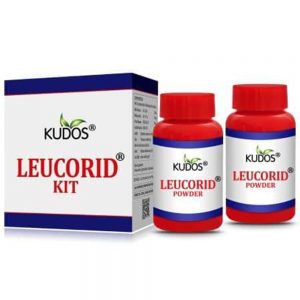Leucorrhea and Women’s Health: A Closer Look at Medicine and Treatment Options
Leucorrhea refers to a common condition that affects many women, characterized by a thick, whitish or yellowish vaginal discharge. It is often caused by an increase in the production of vaginal fluids, resulting from hormonal changes, infections, or other underlying factors. Leucorrhea is typically odorless and may vary in consistency throughout a woman’s menstrual cycle. It is crucial to recognize the significance of women’s health and promote awareness about common conditions like leucorrhea. Women’s health encompasses various aspects, including reproductive health, overall well-being, and the importance of maintaining a healthy lifestyle.
Understanding leucorrhea is vital for several reasons:
- Normalizing Women’s Experiences: Leucorrhea is a natural occurrence in women and is often part of their reproductive cycle. By discussing it openly, we help normalize women’s experiences and eliminate any stigma or embarrassment associated with the condition.
- Promoting Self-Care: By educating women about leucorrhea, we empower them to take charge of their health and well-being. They can learn to differentiate between normal and abnormal discharge, recognize potential causes, and seek appropriate medical advice when necessary.
- Identifying Underlying Issues: While leucorrhea is generally harmless, it can sometimes indicate an underlying infection or medical condition. By understanding the symptoms and potential causes, women can be more proactive in identifying any issues that may require medical attention. Early detection and treatment can prevent complications and promote better overall health.
- Preventing Misinformation: Lack of knowledge about leucorrhea can lead to misconceptions and misinformation. By providing accurate and reliable information, we can combat myths, dispel fears, and ensure women make informed decisions about their health.
- Supporting Well-Informed Choices: Women who understand leucorrhea can make informed choices about their sexual and reproductive health. Whether it involves contraception, fertility planning, or maintaining intimate hygiene, having accurate knowledge empowers women to make decisions that align with their individual needs and circumstances.
Leucorrhea

Causes of Leucorrhea:
- Normal Vaginal Discharge: It is important to note that vaginal discharge is a natural and healthy occurrence. The vagina produces a certain amount of fluid to maintain its cleanliness and lubrication. This discharge can vary in consistency, color, and amount throughout the menstrual cycle.
- Infections: Leucorrhea can be caused by various infections, such as:
- Bacterial Vaginosis (BV): BV occurs due to an imbalance in the naturally occurring bacteria in the vagina. It often leads to a thin, grayish-white discharge with a distinct fishy odor.
- Yeast Infections: Candida, a type of fungus, is responsible for yeast infections. Symptoms include a thick, white, cottage cheese-like discharge accompanied by itching and irritation.
- Sexually Transmitted Infections (STIs): Certain STIs can cause leucorrhea. Examples include:
- Trichomoniasis: This is a common STI caused by the parasite Trichomonas vaginalis. It typically leads to a frothy, yellowish-green discharge with a strong odor.
- Gonorrhea and Chlamydia: These bacterial infections can cause abnormal vaginal discharge, along with other symptoms like pain during urination and pelvic discomfort.
- Hormonal Imbalances: Hormonal changes can affect vaginal discharge. For instance:
- Ovulation: The discharge may turn clear, slick, and stretchy during ovulation, mimicking egg whites.
- Pregnancy: Increased estrogen levels during pregnancy can cause a thicker, whitish discharge.
- Other Underlying Medical Conditions: Certain medical conditions may contribute to leucorrhea. These can include cervical polyps, uterine fibroids, endometritis (inflammation of the uterine lining), or cervical cancer. These conditions often present with additional symptoms, such as pelvic pain or abnormal bleeding.
Symptoms of Leucorrhea:
- Changes in Vaginal Discharge: One of the main symptoms of leucorrhea is a noticeable change in vaginal discharge. This may include an increase in volume or a change in consistency, color, or odor.
- Color, Odor, and Consistency of Discharge: Leucorrhea can vary in color, ranging from clear or white to yellow, green, or gray. The odor may be mild or strong, depending on the underlying cause. Consistency can range from thin and watery to thick and curd-like.
- Associated Symptoms: In addition to changes in discharge, leucorrhea may be accompanied by other symptoms, such as:
- Itching or Irritation: Discomfort in the vaginal area, including itching or irritation, can be experienced.
- Burning Sensation: Some women may feel a burning sensation during urination or intercourse.
- Redness or Swelling: The vaginal area may appear red, swollen, or inflamed.
It is important to note that symptoms can vary depending on the cause of leucorrhea and the individual’s overall health.
Diagnosis Of Leucorrhea
Medical History and Physical Examination:
When diagnosing leucorrhea, healthcare professionals often begin with a comprehensive medical history and a thorough physical examination. They will inquire about the patient’s symptoms, including the characteristics of the discharge and associated discomfort. The medical history helps identify potential risk factors, underlying medical conditions, or recent changes in medication that may contribute to the condition.
During the physical examination, the healthcare provider will visually inspect the vaginal area for any signs of inflammation, redness, swelling, or abnormal discharge. They may also perform a pelvic examination to assess the condition of the cervix, uterus, and surrounding tissues.
Laboratory Tests:
Laboratory tests are commonly used to diagnose leucorrhea and identify the underlying cause. These tests may include:
- Microscopic Examination of Discharge: A sample of the vaginal discharge is collected and examined under a microscope. This helps identify any microorganisms, such as bacteria, yeast, or parasites, that may be present and causing the infection.
- pH Level Testing: pH level testing measures the acidity or alkalinity of the vaginal discharge. Different causes of leucorrhea may result in variations in pH levels. For example, bacterial vaginosis typically leads to an elevated pH level above 4.5.
- Cultures and Sensitivity Tests: In some cases, a sample of the vaginal discharge may be cultured to identify the specific microorganism causing the infection. This allows healthcare providers to determine the most effective treatment by testing the microorganism’s sensitivity to different antibiotics or antifungal medications.
Treatment Options For Leucorrhea
Non-medical Approaches:
While some cases of leucorrhea may require medical intervention, there are non-medical approaches that can help manage and prevent the condition. These include:
- Maintaining Proper Hygiene: Practicing good hygiene is crucial in managing leucorrhea. Clean the genital area gently with mild, unscented soap and warm water. Avoid harsh soaps, douches, and perfumed products that can disrupt the natural balance of vaginal flora.
- Wearing Breathable Underwear: Choose underwear made from breathable fabrics, such as cotton, that allow air circulation and help keep the vaginal area dry. Avoid tight-fitting or synthetic underwear, as they can trap moisture and promote bacterial growth.
- Avoiding Irritants: Refrain from using vaginal douches, scented feminine hygiene products, and strong perfumes near the genital area. These can disrupt the natural pH balance and irritate the vaginal tissues, leading to increased discharge.
- Practicing Safe Sex: Use condoms consistently and correctly to reduce the risk of sexually transmitted infections (STIs) that can cause leucorrhea. Limit the number of sexual partners and ensure regular STI screenings for early detection and treatment.
Medical Interventions:
In cases where leucorrhea is caused by infections, hormonal imbalances, or underlying medical conditions, medical interventions may be necessary. These can include:
- Antibiotics for Bacterial Infections: If the leucorrhea is caused by a bacterial infection like bacterial vaginosis or certain STIs, antibiotics may be prescribed. The specific antibiotic will depend on the identified bacteria and its sensitivity to different medications.
- Antifungal Medications for Yeast Infections: For leucorrhea caused by a yeast infection (such as candidiasis), antifungal medications, such as creams, suppositories, or oral tablets, may be recommended. These medications help eliminate the overgrowth of yeast and alleviate symptoms.
- Antiviral Drugs for STIs: In the case of leucorrhea caused by certain viral STIs like herpes or human papillomavirus (HPV), antiviral medications may be prescribed to manage the infection and reduce symptoms.
- Hormonal Therapy for Hormonal Imbalances: If hormonal imbalances are contributing to leucorrhea, hormonal therapy may be suggested. This can involve hormone replacement therapy (HRT) or other medications to regulate hormone levels and restore balance.
- Treatment of Underlying Medical Conditions: If leucorrhea is a symptom of an underlying medical condition such as cervical polyps, uterine fibroids, or cervical cancer, the treatment will focus on addressing the specific condition. This may involve surgical removal of the polyps or fibroids or appropriate treatment for cancer.
Prevention and Self-care
Tips for Preventing Leucorrhea
While leucorrhea is a natural occurrence for many women, there are preventive measures that can help reduce the frequency and intensity of symptoms. Here are some tips for preventing leucorrhea:
- Maintaining Good Genital Hygiene: Practice good hygiene by cleaning the genital area gently with mild, unscented soap and warm water. Avoid excessive scrubbing or using harsh soaps, as they can disrupt the natural balance of vaginal flora.
- Avoiding Excessive Douching: Douching is not necessary and can disrupt the natural pH balance of the vagina. It is recommended to avoid douching unless specifically advised by a healthcare professional.
- Using Condoms and Practicing Safe Sex: Consistently using condoms during sexual intercourse can help reduce the risk of sexually transmitted infections (STIs) that can lead to leucorrhea. It is also important to limit the number of sexual partners and undergo regular STI screenings.
- Maintaining a Healthy Lifestyle: A healthy lifestyle can contribute to overall vaginal health. This includes:
- Eating a Balanced Diet: Consume a nutritious diet rich in fruits, vegetables, whole grains, lean proteins, and healthy fats. A balanced diet can support a strong immune system and overall vaginal health.
- Staying Hydrated: Drink an adequate amount of water daily to maintain hydration and support vaginal health.
- Getting Sufficient Sleep: Aim for a good night’s sleep as it promotes overall well-being and a healthy immune system.
Self-Care Measures for Leucorrhea:
In addition to preventive measures, certain self-care practices can help manage leucorrhea symptoms and promote vaginal health. These include:
- Managing Stress Levels: High levels of stress can impact hormonal balance and immune function. Engage in stress-reducing activities such as yoga, meditation, deep breathing exercises, or any other activities that help you relax and unwind.
- Eating a Balanced Diet: Consuming a nutrient-rich diet helps support a healthy immune system and overall vaginal health. Include foods rich in vitamins, minerals, and antioxidants, such as fruits, vegetables, whole grains, lean proteins, and probiotics.
- Regular Exercise: Engaging in regular physical activity promotes blood circulation, boosts the immune system, and helps maintain a healthy weight. Choose activities you enjoy, such as walking, swimming, or dancing, and aim for at least 30 minutes of exercise most days of the week.
- Avoiding Tight-Fitting Clothes: Wearing tight-fitting clothes, especially synthetic materials, can restrict air circulation and promote moisture retention in the genital area. Opt for loose-fitting, breathable cotton underwear and clothing to promote airflow and reduce the risk of irritation.
Conclusion
Leucorrhea, or abnormal vaginal discharge, can be a common concern for many women. In this article, we have discussed various aspects of leucorrhea, including its causes, symptoms, diagnosis, and treatment options. Let’s recap the key points covered:
Leucorrhea can be caused by various factors, including normal vaginal discharge, infections (such as bacterial vaginosis and yeast infections), sexually transmitted infections (STIs), hormonal imbalances, and underlying medical conditions. Symptoms may include changes in vaginal discharge, alterations in color, odor, and consistency of discharge, as well as associated symptoms like itching, burning, and irritation.
Remember, every woman’s experience with leucorrhea may be unique, and it is important to consult a healthcare professional for personalized advice and treatment. Prioritizing women’s health empowers individuals to take control of their well-being and ensures a healthier future.
Recommended Leucorrhea Medicine
Leucorrhea, also known as vaginal discharge, is a common condition that affects many women. It is characterized by a white or yellowish discharge from the vagina, often accompanied by itching, irritation, and a foul odor. When it comes to treating leucorrhea, there are several medications that may help you Here are a medications commonly used to address leucorrhea








